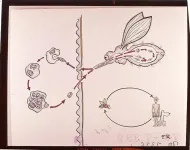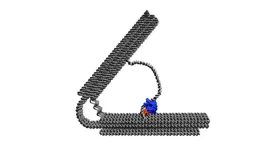(Press-News.org)
Researchers from North Carolina State University have pinpointed a particular peptide’s role in activating atopic dermatitis, or eczema. The work could lead to more effective treatments for the condition.
Atopic dermatitis (AD) is a skin condition characterized by itching, irritated and thickened skin at the site of the irritation. The brain natriuretic peptide (BNP) is a peptide, or short chain of amino acids, that is elevated in patients with AD.
“BNP is expressed in sensory neurons, the neurons responsible for conveying sensation to the brain via the spinal cord,” says Santosh Mishra, associate professor of molecular biomedical sciences at NC State and corresponding author of the work. “We know from previous work that BNP helps translate the sensation of itch from the skin to the brain. In this work we wanted to see if BNP was involved in activating AD.”
In a chemically induced mouse model of AD, the researchers saw that mice without BNP did not exhibit the thickened or irritated skin commonly associated with AD, and their itching was reduced compared with control mice who did have BNP.
“The results show that BNP likely plays a role in itch activation,” Mishra says. “We next looked at BNP’s relationship to periostin, to see if we could determine how that activation takes place.”
Periostin is a protein that can interact with sensory neurons in skin to activate itch response. It is produced in skin cells called keratinocytes and fibroblasts. Keratinocytes in turn, have receptors for BNP, which are called NPR1 receptors. When the BNP receptors are activated, periostin is produced and itch can be turned on.
“But the interesting thing here is that the sensory neurons are the activator,” Mishra says. The neuron releases BNP, which activates keratinocytes with the NPR1 receptor, which then release the periostin.
“This work shows that peripheral neurons, not just central neurons, are playing a role in AD – it begins in the sensory neurons, and cascades from there,” Mishra adds. “It also points to some potential therapeutic strategies, such as blocking BNP’s ability to bind to NPR1 receptors in the skin.”
The research appears as a letter to the editor in the Oct. 11 issue of the Journal of Investigative Dermatology. The work was supported by the National Institutes of Health under grant number 1R56AR077692-01. NC State undergraduate student Junho Yu, former NC State undergraduate student Nidha Williams, and NC State postdoctoral research scholar Joshua Wheeler, also contributed to the work.
-peake-
Note to editors: An abstract follows.
“BNP Exerts Inflammation and Peripheral Itch in a Mouse Model of Atopic Dermatitis”
DOI: 10.1016/j.jid.2023.09.273
Authors: Joshua J. Wheeler, Nidha Williams, Junho Yu, Santosh K. Mishra, North Carolina State University
Published: Oct. 11 in Journal of Investigative Dermatology
Abstract:
Atopic dermatitis (AD) is a globally prevalent disease that affects both children and adults, and the incidence of AD is increasing worldwide (Bylund et al, 2020). AD is characterized by dry, inflamed, and itchy skin, but the etiology behind neuroinflammation and itch related to AD skin is only beginning to be understood. The brain natriuretic peptide (BNP), a byproduct of the Nppb gene, is expressed in primary afferent neurons which are known to be responsible for central itch (Mishra and Hoon, 2013), (Pitake et al, 2018, Meng et al, 2018) (Mishra et al, 2020) (Usoskin et al, 2015). Periostin, an extracellular matrix protein is highly expressed in chronic allergic/inflammatory skin diseases and most recently implicated in itch (Hashimoto T et al, 2021). However, the precise role of BNP in peripheral skin-derived inflammation and itch remains unclear. Here we sought to investigate the possible mechanistic relationship between BNP and the extracellular matrix protein periostin in neurogenic inflammation and itch using BNP knockout (KO) mice. The current study aimed 1) to examine whether BNP causes peripheral skin inflammation and itch; and 2) to determine if BNP-induced release of periostin (and perhaps additional cytokines) is related to inflammation and itch.
END
CHAPEL HILL, NC – Postpartum depression (PPD), a common subtype of major depressive disorder, is more heritable than other psychiatric conditions, yet the genetics of PPD are understudied compared to these other psychiatric conditions., such as anxiety and bipolar disorder.
To remedy that, UNC School of Medicine researchers led an international team of researchers to conduct the largest-ever meta-analyses of genome-wide association studies (GWAS) to investigate the genetic architecture of PPD.
Published in the American Journal of Psychiatry, their research shows that approximately 14 percent of the variation seen in PPD cases can be attributed to common genetic factors. A patient’s ...
A University of Oklahoma-led article published in Geophysical Research Letters highlights newly measured extremes recorded during the National Aeronautics and Space Administration Dynamics and Chemistry of the Summer Stratosphere field project.
“Extreme Altitudes of Stratospheric Hydration by Midlatitude Convection Observed During the DCOTSS Field Campaign,” led by OU School of Meteorology Interim Director and Associate Professor Cameron Homeyer, summarizes the extremes in measured stratospheric depth of hydration by convection recorded during the DCOTSS project as a whole, and ...
Golden retrievers are one of the most popular breeds of dogs. But research shows they have up to a 65% chance of dying from cancer. In a new study, University of California, Davis, researchers set out to find if certain genetic factors could help their survival rate. But instead of searching for genes associated with a cancer diagnosis in the breed, they instead chose to look for genes associated with longer life.
The gene they found is in a family of proteins long known to be important in human cancers. Specific versions or variants ...
Each year, approximately 200 to 300 children in the United States are diagnosed with diffuse midline gliomas (DMG), a tumor that begins in the brain or spinal cord.
The tumors cannot be removed through surgery due to their location in the brain, and current treatments are not effective and lead to a nearly zero percent survival rate.
The University of Cincinnati’s Timothy Phoenix is part of a multi-investigator collaborative team with St. Jude Children’s Research Hospital’s Stephen Mack, PhD, and Giedre Krenciute, PhD, that received a nearly $4 million National Cancer Institute (NCI) ...
CHICAGO (October 19) — Scientists have new evidence that a tropical disease once seen almost exclusively in returning travelers is now being detected in the United States in people with no international travel history — and caused by a Leishmania parasite strain that’s distinctly different from “imported” cases, according to an analysis from researchers at the U.S. Centers for Disease Control and Prevention (CDC) presented today at the Annual Meeting of the American Society of Tropical Medicine and Hygiene (ASTMH).
The study, led by CDC scientist Marcos de Almeida, emerged from a curious rise of domestic infections over the last 10 years, ...
An international team of scientists headed by the University of Bonn has developed a novel type of nanomotor. It is driven by a clever mechanism and can perform pulsing movements. The researchers are now planning to fit it with a coupling and install it as a drive in complex machines. Their findings have now appeared in the journal Nature Nanotechnology.
This novel type of motor is similar to a hand grip trainer that strengthens your grip when used regularly. However, the motor is around one million times smaller. Two handles are connected by a spring in a V-shaped structure.
In a hand grip trainer, ...
HOUSTON ― Researchers at The University of Texas MD Anderson Cancer Center have discovered that lactate-producing intratumoral bacteria drives resistance to radiation therapy, suggesting that lactic acid-producing bacteria present in various cancers may serve as novel therapeutic targets.
The study, published today in Cancer Cell, reported that a particular bacterial species, Lactobacillus iners (L. iners), caused cancer cells to respond to radiation by rewiring metabolic signaling pathways to resist treatment. The researchers also found that L. iners was associated with poorer clinical outcomes in patients with cervical ...
While the overall incidence and death rates from cervical cancer have dropped in the U.S., the opposite has been occurring in Appalachian Kentucky – a steady increase. The death rate from cervical cancer in Appalachian Kentucky is now twice that of the national rate.
A team of cancer population scientists from MUSC Hollings Cancer Center and the University of Kentucky Markey Cancer Center documented the increase through investigation of county-level data from 2000 through 2019. Their findings are published this month in JAMA Network Open.
“The rapidly growing disparities that we're ...
Study suggests that adhering to a Mediterranean diet may alleviate or prevent posttraumatic stress disorder (PTSD) symptoms
The human gut microbiome has a significant impact on our health. Research has shown that it can influence the development and response of emotions, but the relationship between posttraumatic stress disorder (PTSD) and the gut microbiome has been unexplored. PTSD is a fear-based mental health disorder that develops in some individuals who experience a disturbing and horrifying situation involving severe injury, actual or threat of death, or violence. A new study by investigators from Brigham and Women’s Hospital, a founding member of the Mass General Brigham healthcare ...
About The Study: The findings of this study that involved the use of data from Hong Kong and Singapore suggest that trust in health authorities was fundamental to overcoming COVID-19 vaccine hesitancy. As such, engendering trust in health care professionals, experts, and public health agencies should be incorporated into pandemic preparedness and response.
Authors: Michael Y. Ni, M.D., of the University of Hong Kong, is the corresponding author.
To access the embargoed study: Visit our For The Media website at this link https://media.jamanetwork.com/
(doi:10.1001/jamanetworkopen.2023.37909)
Editor’s Note: Please see the article ...





